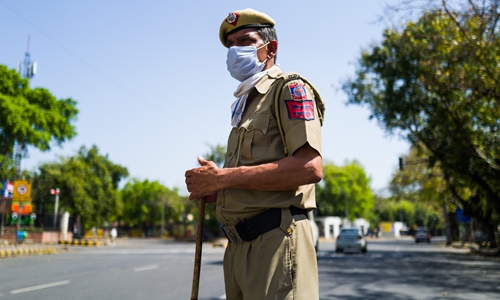HOME >> OPINION
India must walk a fine line between containing virus and keeping economy running
Source:Global Times Published: 2020/3/29 19:08:41

A policeman stands guard at a roadblock during the first day of a 21-day government-imposed nationwide lockdown as a preventive measure against the COVID-19 coronavirus in New Delhi on Wednesday. India's billion-plus population went into a three-week lockdown on Wednesday, with a third of the world now under orders to stay indoors. Photo: AFP
The willingness of Chinese people to follow their government's instructions is a lesson to the world, including India, on how to effectively address the novel coronavirus outbreak.Indian Prime Minister Narendra Modi announced a 21-day nationwide lockdown starting midnight March 24, saying it was the only way to break the novel coronavirus infection cycle.
He urged the public to stay inside their homes for three weeks, and warned failure to do so would set the country back 21 years and families would be destroyed, India's Economic Times reported.
According to the data released by the Ministry of Health and Family Welfare of India, as of Sunday, 867 active COVID-19 cases and 25 deaths had been confirmed, which is far less than Italy, the worst-hit country in Europe, with confirmed some 92,742 cases as of Sunday. So why would Modi take such tough measures so urgently?
Although there are only fewer than 900 confirmed cases in India, it remains unknown how many people are actually infected, as New Delhi doesn't have the resources to carry out all-out, large-scale tests.
While the pandemic spreads around the world, India can hardly remain immune. Modi's order for the nation to self-quarantine will likely help, but it will need the willing cooperation of the people.
Strict quarantine measures are the most effective way to curb the spread of the virus. India seems to have learned a lesson from China.
Indians, living in a democratic system, sometimes question and oppose government orders, adding to the burden of authorities as they attempt to implement tough measures. What's worse, without a comprehensive remote monitoring system like China's, India may not be capable of tracking citizen's movements.
It remains uncertain whether Indians would follow their government's instructions. If the public is not fully aware of the unprecedented threat of the coronavirus outbreak, they may ignore the order.
If indeed fewer than 900 people have been infected in a country with a population of over 1.3 billion, India's outbreak remains far from severe, and this could impede people from taking the self-quarantine order seriously.
Around the world, we've seen people ignore the threat and danger of the virus until it's too late to effectively contain its spread.
With very high population density and a weak healthcare system, if the Indian government fails to coordinate its coronavirus fight with the public, the consequence will be unexpected.
In metropolises such as Mumbai (population 22 million) and New Delhi (population 30 million), where there is by necessity close public interaction, a widespread outbreak of the disease could pose a grave threat to the Modi administration.
Yet a strict lockdown will be a major blow to India's economy. The impact on the economy of a production shutdown will be far greater than any national disaster, making it even more difficult to completely enforce the quarantine order, which in turn has the potential to trigger a severe outbreak. The Modi administration is faced with a difficult dilemma.
India and China share a number of similarities. They both have populations exceeding 1 billion and both are developing countries. China's successful COVID-19 fight, which featured rapid mobilization of resources and timely public warnings and deep coordination between the government and the people, are lessons India and other countries should heed.
The article was compiled by Global Times reporter Lu Yuanzhi based on an interview with Zhao Gancheng, a research fellow at the Shanghai Institute for International Studies. luyuanzhi@globaltimes.com.cn
Posted in: VIEWPOINT,ASIAN REVIEW